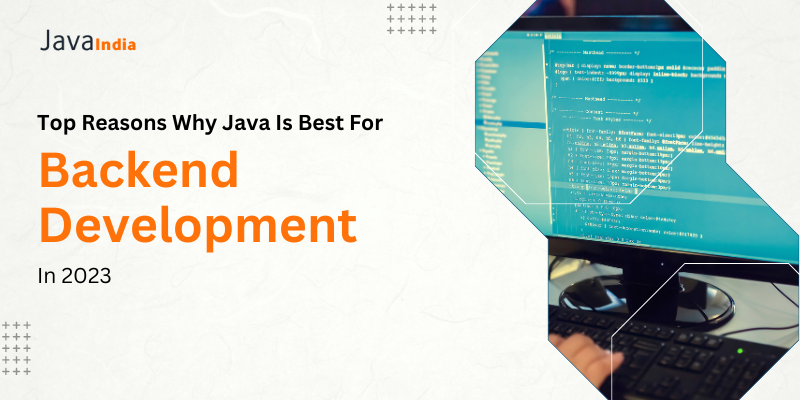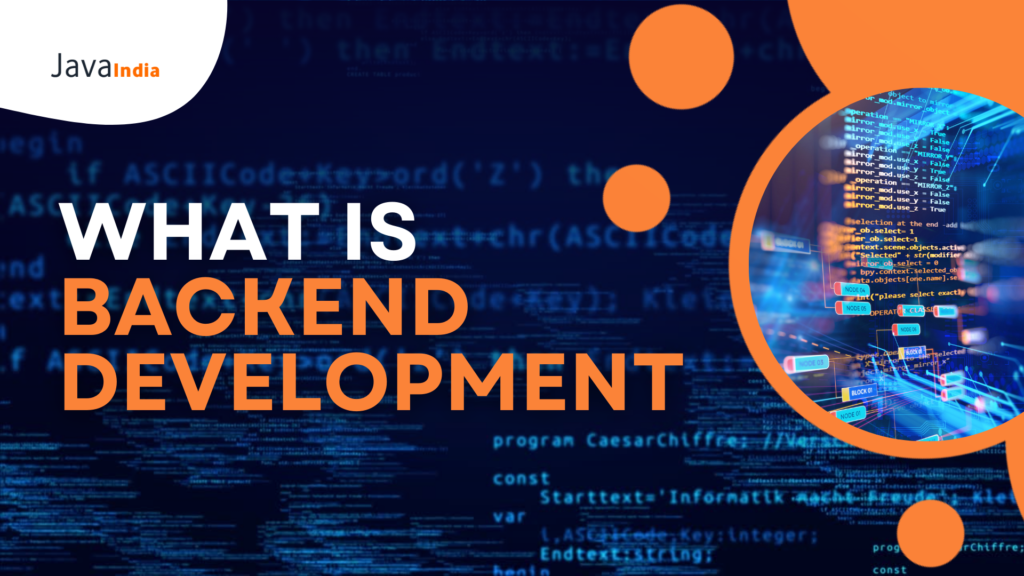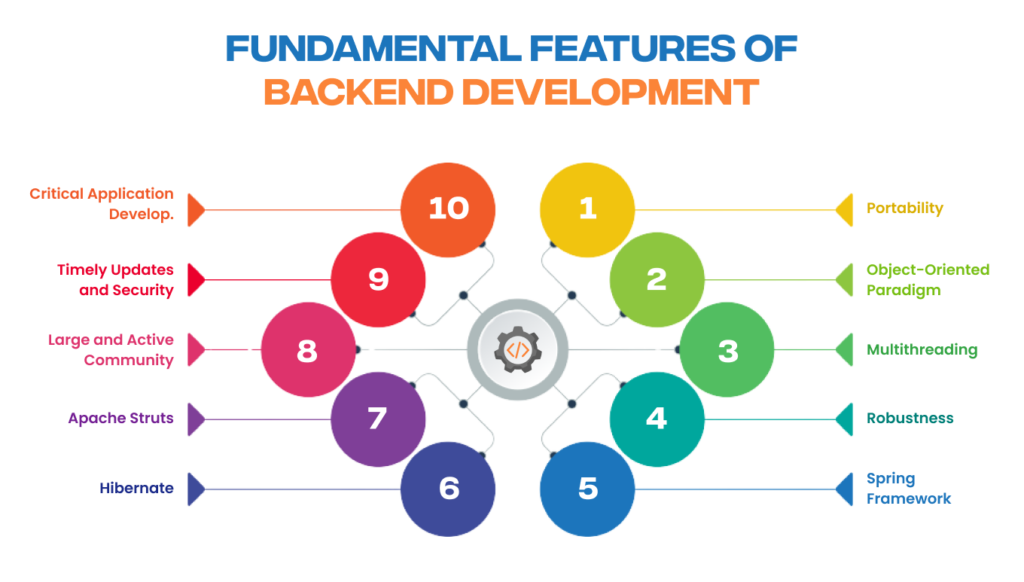
Why Java for Backend Development in 2023 for Business Benefits?
Java is a highly popular programming languages, and developer prefer the platform when it comes to development of a unique, feature-rich mobile or web application. Renowned brands like Google, Uber, Netflix, Airbnb, Amazon, and many more are already leveraging Java for backend development.
So, when you are looking to build a web or mobile application, and looking for best platform, don’t worry. We have discussed most elements in this blog referring importance of Java for Software Development in a simplified and easy manner.

What is Backend Development?
Backend Development talks about the ‘server-side’ referring to the ‘client side’. It includes databases, servers where applications run. Here development, maintenance, and testing of the application is performed. The major responsibility of the backend developers is to ensure the application works properly behind the scenes with complete security and robustness.
Java offers multiple frameworks for backend development like Spring and Hibernate. Both are highly scalable, secure, and efficient. Developer can build microservices using the framework with various APIs. Basically, these microservices helps to communicate with the front end, which user come across for accessing data. In short, front end is the application face while the back end is its brain for smooth running as intended.

Fundamental Features
1. Portability
Java is platform independent and compiled into bytecode, running on any device with a JVM. It follows “Write Once, Run Anywhere” (WORA) approach, allowing developers to build applications that can operate smoothly on multiple platforms without customization. For backend development, interoperability is important, where Java excel.
Object-Oriented Paradigm
Java’s (OOP) feature assist in development of modular and scalable application. The availability of encapsulation, inheritance, and polymorphism is really an important approach to build complex systems with ease. For backend development, where codebase integrity is crucial, the OOP features assist in development of scalable architectures.
Scalable Features
Backend usually come across loads of diverse range from minimal usage to high-demand. Having scalability is important that makes Java for Backend Development a perfect choice.
3. Multithreading
Java’s multithreading enables the simultaneous execution of multiple threads inside the same application. This capability is crucial to handle parallel tasks and enhance application performance. When we talk about the backend development, where handling multiple user requests is important, Java’s multithreading capabilities contribute for scalable applications.
4. Robustness
Java’s design approach focuses on robustness and reliability. The availability of the static typing, integrated with compile-time and runtime checks, is useful to catch errors initially. This focuses on error prevention ensuring the reliability of backend methods, lowering the chances of runtime failures. Moreover, Java’s exception handling technique brings a structured approach to resolve errors, contributing to the application robustness.
Diverse Ecosystem
Java’s diverse ecosystem of libraries, frameworks, and tools, has a vital role in backend development.
5. Spring Framework
The Spring Framework is the most used platform for Java-based backend development. The modular and comprehensive features offered ease the development of complex, large scale applications. With modules present for dependency injection, data access, and web development, the development process is streamlined, supporting developers to focus on robust application development.
6. Hibernate
Another object-relational mapping (ORM) framework offered by Java, resolves the challenges of accessing database. With the presence of a higher level of abstraction in comparison to the relational databases, Hibernate eases data handling, making it a perfect choice of Java-based backend development.
7. Apache Struts
For web application development, Custom Java Software Development Company recommend Apache Struts as a go-to framework. Struts implements the model-view-controller (MVC) architecture, offering a structured methodology to design and develop web applications. The other features comprise of form validation and error handling, thus assisting your business to the development of secure and maintainable backend development.
Strong Community Support
Java has a strong and vivid community offering a crucial role in backend development.
8. Large and Active Community
The community of Java is one of the largest and most experienced in the digital world. They are focused on the community-driven approach helping to achieve continuous improvement in the application development. During the backend development process, developers come across different challenges. Here community offer best practices, and contribute to the improvement of the language. The support available in the form of forums, online tutorials, communities, web seminars and conferences grows the overall business development.
9. Timely Updates and Security
One thing that makes Java for Backend Development is assurance of language receiving regular updates and security fixes. This commitment to keeping the language’s integrity and security is highly significant in backend development, where protecting sensitive data and ensuring application stability are important concerns.
10. Critical Application Development
Java has transformed itself as the most successful and dependent language for building critical applications of all sizes. From development of banking systems to AI platforms, the maturity and stability offered makes it a trusted language. Complex applications requiring high performance, reliability, and security makes Java preferred choice. Several enterprises still using legacy systems developed in Java language. The compatibility ensures that existing applications can easily integrate with modern developments. This compatibility is important for business invested heavily in Java-based solutions.
Frequently Asked Questions
Q1. Is Java perfect to build secure backend applications?
Ans. Yes, Java is in major demand to build secure backend applications. The security features it offers like security manager and bytecode verification helps in eliminating common security vulnerabilities. The emphasis on strong typing and error checking improves overall security of Java application.
Q2. How does scalability is offered to backend applications with Java?
Ans. Java’s support for multithreading brings desired scalability for a business application. The functionality offered to execute different threads simultaneously within the same program supports Java to manage parallel tasks in an efficient manner. To ease the backend development, where systems come across traffic of all volume, Java’s multithreading capabilities is a real advantage for development of responsive and scalable applications.
Q3. Why does Java’s community matter in backend development?
Ans. Java’s strong community provides real-time support to developers during troubles. It facilitates knowledge sharing, troubleshooting, and smooth collaboration in case of development challenges. The community-driven approach guarantees that Java stays updated, and developers can simply access resources to fix challenges.

